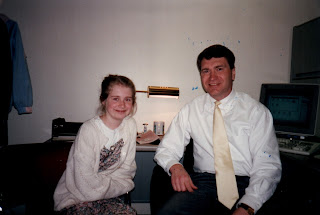Impostor Syndrome
 image creditYou've unlocked the next level of achievements in your life -- admission into a competitive grad program, a coveted promotion, new business ownership, professional accolades. You're feeling all the feels: you're proud, you're excited, and maybe you're even a little bit anxious.
image creditYou've unlocked the next level of achievements in your life -- admission into a competitive grad program, a coveted promotion, new business ownership, professional accolades. You're feeling all the feels: you're proud, you're excited, and maybe you're even a little bit anxious.And then, a new, more unwelcome feeling rears its ugly head: Impostor Syndrome.
Even if you aren't familiar with the term, there's a good chance you have experienced the phenomenon. Impostor Syndrome is the feeling of self-doubt that often arises when we find ourselves in a new arena. It's the feeling that we made it there not by skill or talent, but by sheer luck, and that we are therefore less [intelligent, capable, experienced, qualified, etc.] than others within that same arena. It's the feeling that, at any moment, our lack of [intelligence, capability, experience, qualifications, etc.] will be revealed and we will be exposed as frauds.
If you've felt this way before, you're not alone. According to this article in Time Magazine, as much as 70% of the population has experienced Impostor Syndrome at some point in their lives, and it effects even (or maybe especially) people at the highest levels of professional success. Impostor Syndrome is especially common in people who suffer from anxiety, perfectionism, and those who have internalized the constant pressure to be high achievers.
As I talked about here, perfectionism and the pressure to achieve have been struggles of mine since childhood, and I've found them creeping their way back in since I began my writing journey. Since perfectionism and Impostor Syndrome seem to go hand-in-hand, it's probably no surprise that I've been battling against this phenomenon as well.
As is probably the case for many of us, my experiences with Impostor Syndrome are deeply rooted in childhood, even if I didn't have a name for the feeling back then. In upper elementary school, maybe 4th or 5th grade, we had to write sample essays in preparation for our state standardized tests, and the teacher chose my essay as the exemplar to share with the class. I'm sure I felt proud and happy in that moment, but I have a very distinct memory of some other, more negative feelings underlying that moment as well -- there was a feeling of being undeserving, that the recognition was only the result of good luck. The same thing happened in 6th grade when I was chosen to read something in front of the entire school at an assembly. I felt unworthy, because surely there was someone else who would have been a better choice. Over the years, it happened again and again -- every award, accolade, or accomplishment was accompanied by feelings of self-doubt and sometimes even shame.
In retrospect, I realize now that many of the choices I've made in my professional life have been made in avoidance of the curse of Imposter Syndrome. I chose a university that was one of my "safety" schools because I reasoned that I'd be less likely to doubt that I belonged there. I thought that if I chose a "safe"school, a "safe" major, a "safe" career, a "safe" path, my life might be free of those feelings of self-doubt and unworthiness once and for all. You know that saying about being a big fish in a small pond? Well, Imposter Syndrome will convince that us that in the big pond, we don't have even the slightest chance at success. But if we put ourselves in a smaller pond, we might actually have a shot at growing to be the "big fish" we're still not entirely convinced we are capable of becoming.
But life has a way of humbling us, of teaching us that there is no such thing as "easy street" -- that even what we thought of as the path of least resistance can still be rife with obstacles that make us doubt our competence.
During college, I was enrolled in a 5-year teaching program, meaning that at the end of 5 years, I'd have both my B.A. (in English) and my M.A. (in teaching - Secondary Education), as well as all of the course requirements needed to obtain my teaching certification. I felt like I was doing all of the right things to prove my worthiness -- I made Dean's List every semester, built up my resume with extracurriculars and teaching-related part time jobs, tried to go above and beyond so that I'd get glowing letters of recommendation from my superiors. By the time I graduated, I was feeling pretty good about my abilities and my career prospects -- those old feelings of self-doubt and undeserving had all but vanished, replaced by what seemed like unshakable confidence. That summer, I set out in my new interview suit, ready to take on the world.
Grad school graduation, 2007: A bright-eyed optimist, ready to take on the world.
By mid-August that first summer after graduation, I had probably interviewed in 20 different school districts. Some interviews resulted in invitations back for second interviews or sample lessons. None resulted in job offers. Week by week, interview by interview, I felt my bright-eyed optimism draining away, replaced by cynicism and shame. As the first signs of impending autumn began to appear -- red tipped leaves on the trees, displays of school supplies in every store, and a slight fall crispness on the breeze -- all I could think about was how this signified my failure. The school year was going to begin and I still didn't have a teaching job. What did that say about me? What would people think?
Ultimately, I did end up getting hired for a teaching position in the second half of August. It was for a 1-year, temporary position, covering the maternity leaves of two teachers in the English department of a highly-rated high school. But by then, my imposter syndrome had already fully set in. Surely, if I was really as capable and qualified and talented as I had believed myself to be, it wouldn't have been such a struggle to find a job; I would have been hired months earlier, like many of my classmates had been. Back then, I told myself that the only reason I'd even been hired is because it was the end of the summer, and the best applicants had already been swept up by other districts. I told myself that I didn't really deserve to be there at all.
And so, Imposter Syndrome permeated those first few years of teaching. I decided that the best way to combat it was to make it look -- at all costs -- like I knew what I was doing. Fake it 'til you make it.
I didn't ask for help. I didn't ask for anything. Instead of asking my colleagues to share materials, I made everything -- tests and quizzes and worksheets -- from scratch. Instead of asking the seasoned teachers for advice about classroom management strategies when my students weren't cooperating, I suffered through it alone. Somewhere along the way, I'd convinced myself that asking for help was a sign of weakness -- that the best way to prove my competence and to assure everyone that I really did deserve to be there was to make it look like I was always on top of things and that I was doing just fine on my own.
Of course, this mindset only compounded my struggles. For one, I wasn't really giving myself a chance to grow professionally, because I wasn't opening myself up to advice and feedback from my colleagues. I was also constantly reinventing the wheel, focusing my time and attention on creating materials when I probably should have spent it sharpening my classroom management strategies or pedagogical skills. Instead of learning from the wisdom of the seasoned teachers all around me, I chose to swim against the strong current alone, in a constant struggle just to stay afloat. What followed was several summers filled with interviews, several years of temporary teaching positions, and a constant feeling of having to, as Brene Brown puts it, "hustle for worthiness."
A couple years into my teaching career, after yet another setback on my path, I sat down with an assistant superintendent to have a candid discussion about everything that was going on. He told me about some of the challenges he'd experienced early in his career, and I remember my jaw falling open. Here was this person who'd reached what I considered the pinnacle of success in our field, and he, too, had experienced rejection, failure, and disappointment early on. Instead of giving up, he'd used those experiences as the foundation on which to build his career. It was a turning point for me -- up until then, I'd never really heard successful people talk about their failures. It was a taboo subject. For whatever reason, I'd had the impression that setbacks are a sign that you're on the wrong path, that rejection equalled unworthiness, that the best and brightest didn't struggle.
It took a very long time for me to recover the confidence I'd lost during those first few years of my career, from the perceived failures and stumbling blocks that had peppered my path in those early days of teaching. Building back my self-worth took a lot of inner work, reflection, and some very special colleagues who helped me to rediscover my strengths and remind me of my capabilities. But even more than that, it took time, maturity, and the perspective that comes with growing older.
There is a benefit to all of that now that I am pursuing publication, though. As I am embarking on this new path, fighting my way into this new arena, I know exactly what that insidious thing is lurking there in the shadows, ready to make me question my capability. Impostor Syndrome. Acknowledging its presence and calling it by name immediately diminishes its power.
More than that, though, I understand now that no one reaches success alone. Struggling in silence doesn't make you look strong -- all it does is make you waste time spinning your wheels, draining you of your confidence. And likewise, asking for help isn't weakness -- it's strength. As I've learned, it's actually wise to seek feedback, to draw from the experiences of others, to build a network of support around you.
And so, to my network of friends and family members - thank you. The path to success is often filled with obstacles, but if you're lucky, it's also lined with people cheering you on and ready to lend a hand if only you'll let them.





Comments
Post a Comment